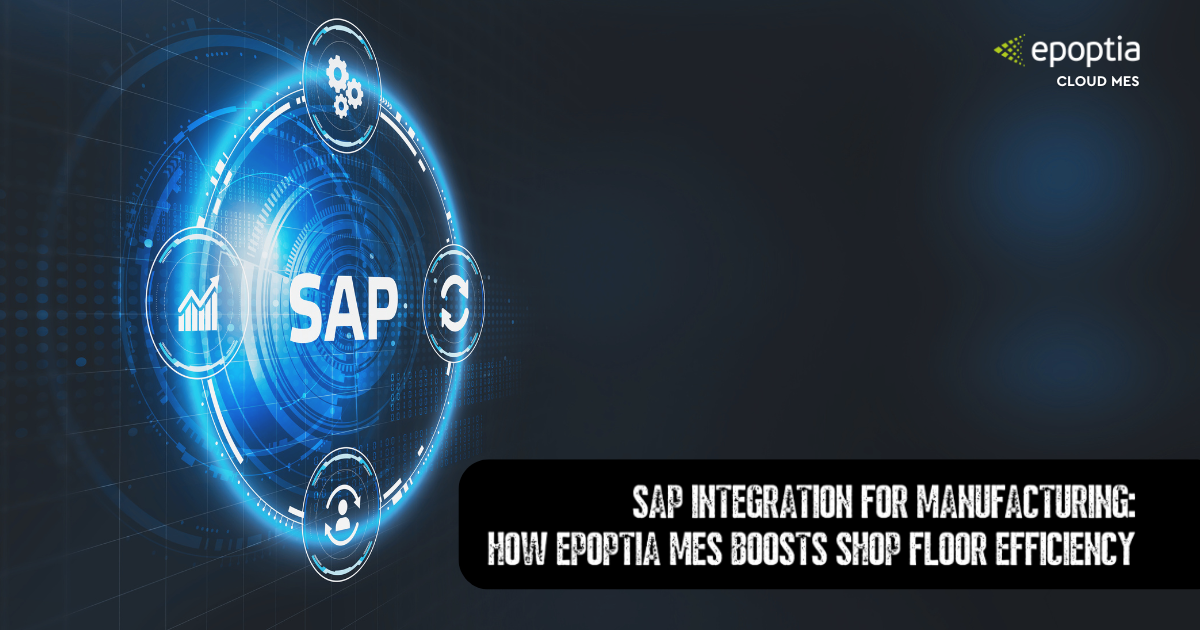Discover how Epoptia MES enhances SAP with real-time shop floor control, seamless data exchange, and paperless production
Modern manufacturers need speed, traceability, and agility on the shop floor. While SAP excels at managing enterprise-wide planning and business functions, it wasn’t designed with frontline factory operations in mind. As a result, companies face several challenges: information from production is delayed, actions are manually recorded, and operators often struggle with a complex user interface. This disconnect between planning and execution can cost time, money, and quality.
Fortunately, there’s a solution.
Epoptia as a Smart SAP Terminal for the Shop Floor
To begin with, to bridge the gap between SAP’s enterprise-level planning and the fast-paced, real-time demands of production environments, manufacturers turn to Epoptia MES. Especially in job shop environments, where process flexibility, traceability, and fast decision-making are vital, Epoptia offers a tailored solution that empowers the shop floor.
Epoptia serves as a smart, intuitive MES layer that enables production teams to interact with SAP efficiently. Rather than pulling data directly, Epoptia receives production orders, workcenters, routing data, and more via API connections, ensuring secure, configurable, and SAP-compliant integration. It then guides operators through the correct steps in real time and sends validated feedback back to SAP, such as completions, material consumption, and labor tracking.
While SAP is designed for computational data management, Epoptia is built to handle the realities of the production environment—bridging the digital system world with the physical world of machines, materials, and people. This ensures live visibility, accurate data collection at the source, and streamlined workflows across the shop floor.
Technical Integration: What Data Is Exchanged?
First things first, understanding how Epoptia MES connects with SAP is crucial. This integration supports seamless communication, ensures data consistency, and enables paperless execution at scale.
Here’s a breakdown of the real-time data exchange:
| 🔽 Pulled from SAP | 🔼 Pushed to SAP |
| Production Orders | Production Confirmations (partial/full) |
| Workcenters | Real-Time Material Consumption |
| Products, BOMs, Routings | Scrap & Defects |
| HR Data: Employees, Shifts | Labor Time Tracking |
| Quality Control Data (optional) |
Why Companies with SAP Choose Epoptia
By combining SAP’s enterprise power with Epoptia’s operational agility, manufacturers unlock a new level of digital transformation. Let’s look at the benefits from both a business and IT perspective.
Business Benefits:
- Transition to a 100% paperless shop floor
- Dramatic reduction in errors from manual data collection
- Faster decision-making with real-time production data
- Aligned visibility from the ERP system down to machine operators
- Minimized need for custom SAP configurations
- Access to actionable KPIs specific to job shop and assembly workflows
IT & Technical Benefits:
- Open API ensures flexible SAP integration
- No changes to SAP infrastructure required, simply plug and play
- Epoptia supports both cloud and on-premise deployment models
- Easily scales across factories, production lines, or geographies
Learn more about Epoptia’s API capabilities in our developer documentation.
MES vs ERP: What’s the Difference?
Moving on, it’s common to confuse MES with ERP. But they serve very different purposes:
| Feature | ERP | MES |
| Focus | Planning & Finance | Shop Floor Execution |
| Users | Management & Admin | Production Supervisors & Workers |
| Timeframe | Long-term Planning | Real-time Control |
| Integration | Company-wide | Shop-floor-specific |
More specifically, think of ERP as the brains, and MES as the hands of your operations. For full efficiency, they should work together.
Real-World Results: SAP Users Who Leveled Up with Epoptia
Moving on, the impact of integrating Epoptia MES with SAP is both measurable and transformative. In industries like metal fabrication and battery assembly, where traceability, precision, and live shop floor feedback are critical, Epoptia MES ensures real-time execution and accurate communication with SAP ERP. These manufacturers benefit immensely from digital workflows, real-time tracking, and operator-friendly interfaces.
The impact of integrating Epoptia MES with SAP is both measurable and transformative. Companies that have adopted this setup report striking improvements:
- Enhanced planning capabilities: SAP provides macro-planning; Epoptia manages micro-scheduling and task allocation
- 100% elimination of confirmation delays
- In a 120-person factory, confirmation time dropped from 6 hours/day to 0
- Zero paper usage across all workstations
- Automatic delivery of materials, specs, and instructions to the right operator at the right time
Conclusion
To sum up, if you’re already using SAP, don’t settle for after-the-fact reporting and manual inputs. Epoptia MES empowers your team with real-time control, complete digital traceability, and next-level productivity on the shop floor.
By integrating Epoptia with SAP, you’re not just enhancing production visibility. You’re future-proofing your manufacturing operations with agility, accuracy, and efficiency at every level.
Contact us to schedule a demo and discover how we can boost your SAP setup.
For more information, check https://bit.ly/3vYnb4f.
Manufacturers typically connect MES systems to SAP ERP using open APIs or standardized connectors. Epoptia MES supports direct integration with SAP through a plug-and-play architecture that doesn’t interfere with the core SAP system. It pulls production orders, BOMs, and HR data from SAP, while sending real-time completions, material usage, and workforce activity back to SAP.
Epoptia MES is a top-tier choice for SAP Business One users, especially in job shop and assembly manufacturing environments. It enhances SAP’s capabilities by enabling real-time shop floor data capture, intuitive task allocation, and seamless feedback loops without requiring custom development or costly infrastructure changes.
Yes. Epoptia is designed to integrate directly with SAP through open APIs. No infrastructure changes required.
Absolutely. Epoptia supports multiple SAP environments, including Business One, making it ideal for small and medium manufacturers.
Epoptia pulls production orders, routings, workcenters, HR shifts, and BOMs from SAP—and returns real-time confirmations, consumption, labor, and scrap data.
Yes. The system is designed to scale, whether you’re managing one plant or a dozen.
Visit the Epoptia Help Center for full API documentation and developer tools.




















